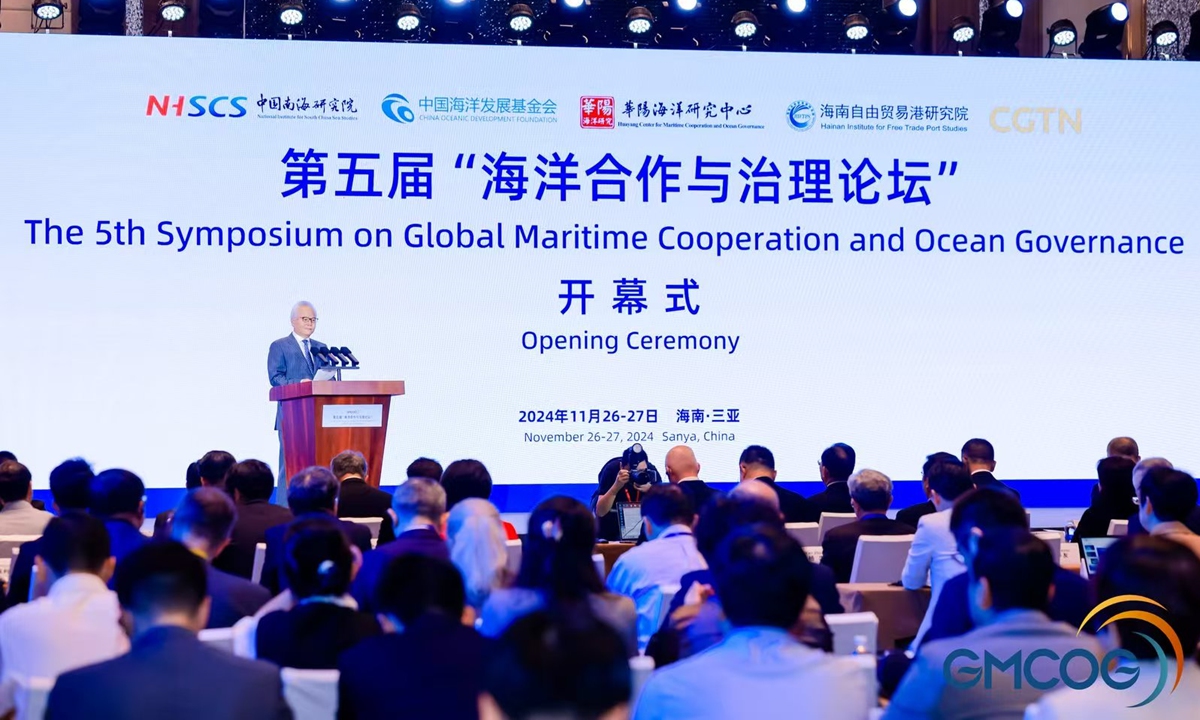
The 5th Symposium on Global Maritime Cooperation and Ocean Governance kicks off on November 26, 2024. Photo: GMCOG
Siding with allies indiscriminately with no regard for what is right and what is wrong will find no international support. Ignoring basic facts and infringing on other's sovereign rights and interests in the name of law will end in failure, Chinese Foreign Minister Wang Yi said while delivering a keynote speech via video at the 5th Symposium on Global Maritime Cooperation and Ocean Governance on Tuesday.
Wang, also a member of the Political Bureau of the Communist Party of China Central Committee, said that China is prepared to work with relevant countries to properly handle maritime differences through negotiations and consultations, maintain peace and stability at sea, and promote lasting ocean security.
Experts and scholars participating in the Symposium also emphasized the importance of resolving maritime disputes through peaceful negotiations based on mutual respect within a multilateral framework.
China believes firmly that enhancing dialogue and cooperation, maintaining maritime peace and stability, and advancing global ocean governance represent the general consensus and the prevailing sentiment of the international community, said Wang, adding that China is ready to work hand in hand with the international community to turn the ocean into a place of peace and tranquility, a source of prosperity and development, and a platform of inter-civilization exchange and integration shared by all countries of the world.
During a session titled Settlement of Maritime Disputes: Dialogue or Confrontation, participating experts agreed that disputes should be resolved through dialogue and cooperation.
In recent time, due to continuous provocations by the Philippines under the instigation of the US, disputes in the South China Sea have become increasingly internationalized and complex. Rommel C. Banlaoi, Chairman of the Philippine Institute for Peace, Violence and Terrorism Research, told Global Times that Philippines government is implementing what he calls an excessive pro-Americanism in its foreign policy, adding that ASEAN is not comfortable with that.
Banlaoi noted that the ASEAN way is balancing relationships between the two major powers, China, and the US, however, the Philippines is favoring the US against China, which is against the principle of ASEAN for friendship, peace and neutrality in the region.
Sorajak Kasemsuvan, a council member of the Asian Peace and Reconciliation Council from Thailand, said that "we have to make sure that all relevant parties continue to engage in dialogue." Ongoing dialogue is essential for enabling cooperation among nations on maritime resources, biodiversity, and environmental issues. Relevant countries should make it clear to external parties that they are managing their own affairs and do not need foreign interference, Kasemsuvan told the Global Times, commenting on the South China Sea issue.
"History shows us that the best way to progress human beings on this planet is through dialogue, not through confrontation. We know that is the central lesson of history," Peter Thomson, the United Nations Secretary-General's Special Envoy for the Ocean, told the Global Times. He also expressed his hope that the South China Sea issue will be resolved by peaceful discussions between the parties involved.
The Symposium, which kicked off on Tuesday in Sanya, South China's Hainan Province, attracted nearly 300 participants, including experts, scholars, former political leaders, senior diplomats from foreign embassies in China and representatives from international organizations and maritime agencies.




